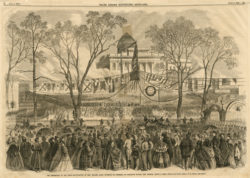Michael Hahn
Bavarian immigrant Michael Hahn served as the first Union governor of Louisiana for one year during the Civil War.

Courtesy of The Historic New Orleans Collection
The Restoration of the Union - Inauguration of Michael Hahn. Bonwill, Charles E. H. (Delineator)
Bavarian immigrant and Unionist Michael Hahn served as the first Union governor of Louisiana for one year during the Civil War. He was elected in a special gubernatorial election held in Union-occupied Louisiana in 1864. Hahn resigned a year later, however, when Stephen A. Hurlbut, the military commander of the Department of the Gulf, refused to recognize his authority. Although criticized for strong Unionist sympathies expressed before, during, and after the Civil War, many of Hahn’s opponents still respected his personal courage, honesty, and civic mindedness.
Georg Michael Decker Hahn, known as Michael for most of his life, was born November 24, 1830, in Klingenmunster in the German Palatinate. As a small child, he accompanied his widowed mother, Magaretha Decker Hahn, and four siblings to New York. About a decade later, the family moved to New Orleans, where his mother died of yellow fever the year after their arrival. Hahn attended local schools and studied law at the University of Louisiana (now Tulane University). In 1851 he worked in the law office of Christian Roselius, future attorney general of Louisiana, and also as a real estate agent and newspaper writer. After graduation, Hahn practiced law and served as a notary public.
A pre-war Democrat, Hahn became a Republican in 1862 when Union military forces occupied New Orleans. That year he also became the US Representative from Louisiana’s second congressional district. During his short stay in Washington, Hahn became friends with Abraham Lincoln. On his return to New Orleans, Hahn bought and edited the New Orleans True Delta, where he promoted the emancipation of enslaved people and various pro-Union policies.
With Lincoln’s support, General Nathaniel Banks, military commander of the Union’s Department of the Gulf, called for a special gubernatorial election in Louisiana in 1864. Hahn, who ran as a moderate Republican, emerged as the victor and the first Union governor of Louisiana; he took office on March 4. As governor, he quickly called for a state constitutional convention to begin rebuilding a civilian government. He also advocated suffrage and the establishment of a school system for African Americans. His powers, however, were soon limited. Major General Stephen A. Hurlbut, who advocated a less lenient policy toward former Confederates, replaced Banks and refused to recognize Hahn’s civil government. In response, Hahn resigned to serve in the US Senate.
Though elected to the senate in January 1865, Hahn, like other southern senators, was denied his seat amidst the turmoil following Lincoln’s assassination. Unfazed, he joined the Republicans in New Orleans and worked to craft a new Louisiana state constitution.
Crippled by a severe gunshot wound suffered in the New Orleans Mechanics’ Institute Riot of 1866, Hahn temporarily retired to his plantation in St. Charles Parish, where he founded the town of Hahnville and published the St. Charles Herald. In 1872 he won a seat in the state legislature where he served until 1878, when he became superintendent of the US Mint in New Orleans. Later, he became judge of the 26th Judicial District. In the fall of 1894, Hahn was re-elected to the US Congress and, this time, took his seat. He died of a ruptured blood vessel in Washington, DC, on March 15, 1886, and was buried in Metairie.
This entry was adapted from Amos E. Simpson and Timothy F. Reilly’s entry for the Dictionary of Louisiana Biography, a publication of the Louisiana Historical Association in cooperation with the Center for Louisiana Studies at the University of Louisiana, Lafayette.
Sources: “Michael Hahn,” Appleton’s Cyclopedia (1900); “Georg Michael Decker Hahn,” Dictionary of American Biography, (1932).
